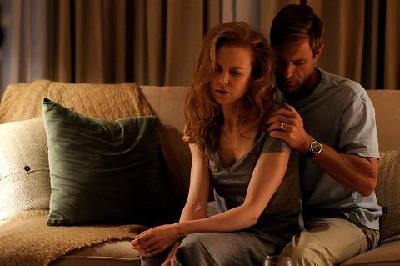
The harrowing experience of losing a child is at the heart of a powerful new film drama adapted from a Pulitzer Prize-winning play. Oscar-winner Nicole Kidman stars and could be a contender again for her performance as the grieving mother opposite Aaron Eckhart as the equally pained father. Here's a look at Rabbit Hole.
"I forget that he's not here sometimes ...that maybe he's just hiding under the bed and is going to pop out like he used to do. I'm trying to make things nice."
"You can't. All right, I'm sorry. Things aren't nice any more."
Becca and Howie had a good life, a happy life in their suburban New York home; but a chance event - a gate left open, their dog darting out into the street and their four-year-old son chasing after it into the path of an oncoming car - has drained them of any happiness.
"It has been eight months."
"I'm not ready yet, Howie. I'm sorry if you think that that's abnormal, but..."
"I don't. I don't think it's abnormal at all but, you know what..."
"So what's the problem?"
"We need to at least head in that direction."
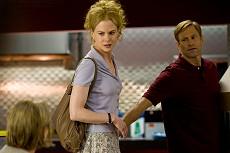
Family members can offer little consolation. Neither does prayer or even group therapy with other bereaved parents.
"God had to take her. He needed another angel."
"He needed another angel."
"Why didn't he just make one? Another angel. I mean, he's God, after all. Why didn't he just make another angel?"
In the end, like Alice in Wonderland in a world turned upside-down when she follows after the White Rabbit, Becca and Howie have to find their own way to cope when life sends them down their own "Rabbit Hole."
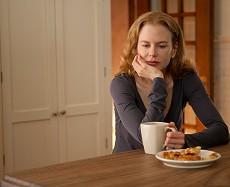
"It's about how do you live each day?" Nicole Kidman stars as 'Becca' and is also producer of the film. She says it challenged her to confront the terrible possibility every parent fears most: the death of a child.
"It's not the broad strokes, it's the minute strokes of choosing to live each day," Kidman says. "How do you live together as a couple having had the most traumatic loss you'll ever have? And how do you still walk through each day and each hour?"
"It feels like maybe I don't feel badly enough for you. Maybe I'm not feeling enough. What do you want from me?"
"Something has got to change because this ...I can't do this like this any more. It's too hard."

"The way that the emotions in the character came to me was through the rawness of loving my children," explains Kidman. "I was able to leap there very quickly and I was amazed at how deep that well is and how available it is."
"There are no pictures of him around. There are no fingerprints. Nothing, damn it; you have to stop erasing him. You have to stop it."
"Do you really think that I don't see him every second of every day?"
"It's a very difficult place to exist in," Kidman adds, "but also the words came easily and the emotions ...actually, a lot of it was how to keep them in because they were available to all of us. For all the actors in the film, a lot of it is restraint because as actors those areas are mined a lot. We are asked to mine those things often and a lot of it is up to the editing and the director about how you modulate it."
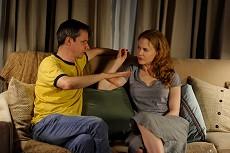
"This film isn't a downer," insists director John Cameron Mitchel. "It doesn't suck you into the abyss. The characters are coming out of the abyss as we begin the film and they are slowly, in their own ways, are trying to find their version of coming into the light."
John Cameron Mitchel directed Rabbit Hole, which he acknowledges can be tough for audiences - especially parents; but he believes the balance of abject grief, unexpected humor and genuine emotion makes it an uplifting, positive experience.
"I don't think I would have wanted to make this film unless there was something about it that was forward thinking [and] gave you hope," Mitchell says. "The journey they go through is quite intense, punctuated by great gales of humor ...relief. There's definitely a 'letting things out' in certain scenes and oddly the kind of gallows humor which is also part of the process is very necessary; but we want this film to be a tool for everyone in order to deal with loss to live their lives. That's what these stories are for."
"Do you think they're real?"
"Parallel universes? I think it's basic science. If space is infinite then everything is possible. There are tons of 'you's' out there and tons of 'me's' floating around."
"Yeah ...and this is just the sad version of us. There are other versions and in these other versions everything goes our way."
"Assuming you believe in science."
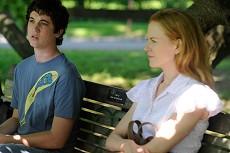
Miles Teller plays the teenaged neighbor also forever connected to the terrible event. Dianne Wiest plays Becca's well-meaning mother whose attempts to console her daughter are met with contempt. Writer David Lindsay-Abaire adapted his own play for the film script; the musical soundtrack is by New York composer Anton Sanko.
bereaved: having lost a relative or close friend who has recently died 喪失親友的
Court orders photographers: stay away from Kidman
(來源:VOA 編輯:崔旭燕)
